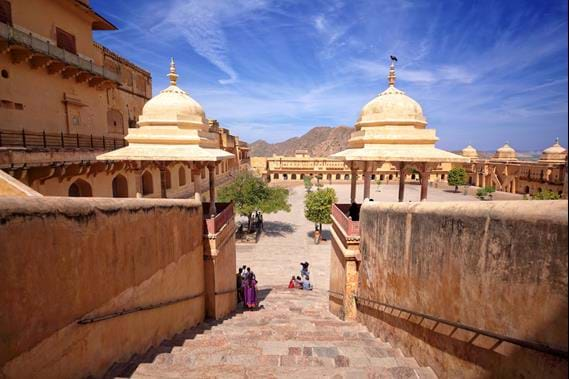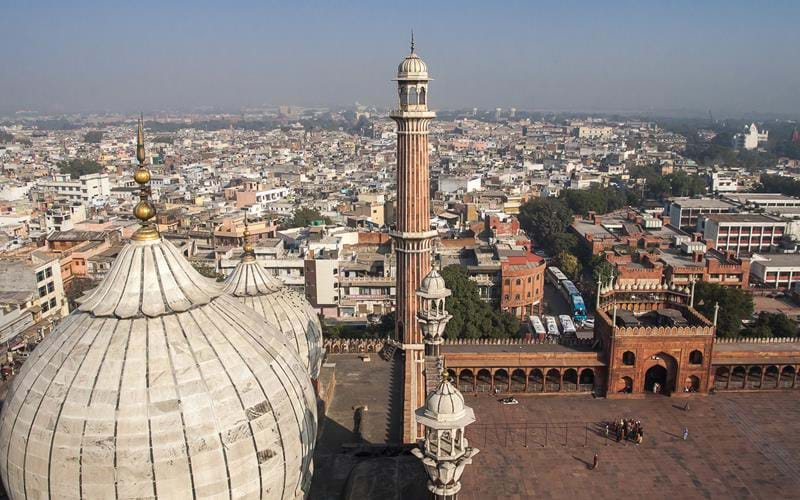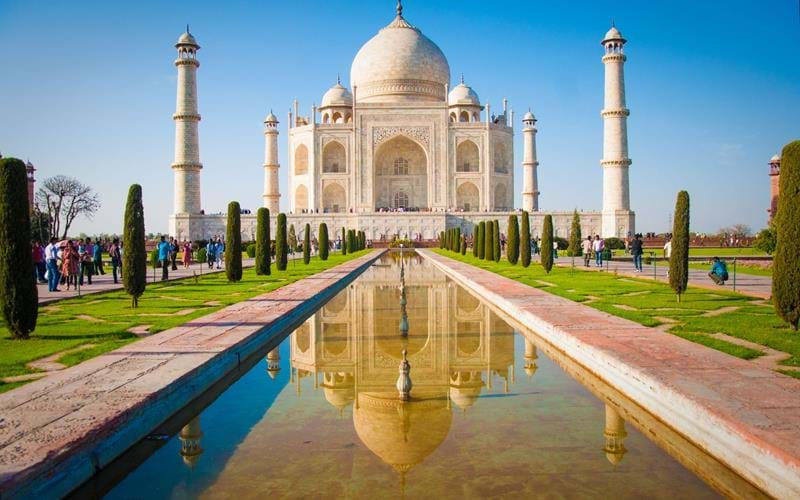One of the questions we’re most frequently asked by clients contemplating their first trip to India is ‘whether to go north or south’? This two-week…
View more
Focusing on Rajasthan’s royal heritage, including the Taj Mahal and other great monuments of the ‘Golden Triangle’, this popular two-week tour follows a classic route around northwest India’s more regal and opulent locations: from the Mughal wonders and packed bazaars of Delhi to Akbar’s ghost city at Fatehpur Sikri, Jaipur (the ‘Pink City’) and the fairy-tale desert citadel of Jaisalmer. From there, you head across the sandflats to Jodhpur, the ‘Blue City’ and end the tour beside the shimmering waters of Lake Pichola at Udaipur. Along the way, we spend time in some rural locations and stay in elegant palaces.

Cultural Holidays Wildlife Holidays River Cruising Holidays Luxury Train Holidays Family Holidays Honeymoons Beach Holidays Adventure Holidays
Greeted on arrival in Delhi and transferred to the Suryaa Hotel or similar for two nights. The remainder of the day is at leisure. There will be a welcome dinner at a local restaurant.
Delhi, the vibrant capital of India, is steeped in a rich history spanning millennia. Its origins trace back to the ancient Indraprastha, mentioned in Hindu epics like the Mahabharata. Over centuries, Delhi evolved through various dynasties, each erecting magnificent structures like the Qutub Minar, symbolizing Islamic architecture's zenith in India.
The Mughals, starting with Babur, further embellished Delhi with grand edifices like the Red Fort and Humayun's Tomb, establishing it as a symbol of power and opulence. The city reached its zenith under Shah Jahan, who built the majestic Taj Mahal in nearby Agra.
British colonial rule marked a relatively new chapter, making Delhi the capital of British India in 1911. Post-independence, it became the seat of the Indian government in 1947, witnessing rapid modernization and urban development. Today, Delhi is a testament to India's diverse cultural heritage, blending ancient legacies with modern aspirations.
Explore Delhi on a full-day sightseeing. Start with a tour of Old Delhi in the morning: enjoy a cycle rickshaw ride in the bustling lanes of Chandni Chowk, followed by a visit to Jama Masjid, the largest mosque in India, and the Raj Ghat, a memorial built for Mahatma Gandhi, a prominent figure in India’s struggle for freedom. Drive through Lutyen’s New Delhi in the afternoon. Visit the tomb of Humayun and the lofty Qutb Minar, an early Mughal structure made of red sandstone and white marble.
Cycle-rickshaws are a relaxing, and eco-friendly, way to explore the lanes of Old Delhi. Different streets are to be given over to different trades in this atmospheric district, which formed the hub of the former Mughal city. Dominating its skyline is the massive white dome of the Jama Masjid mosque, the next stop on your tour. After admiring the extraordinary view from its minarets, enjoy lunch at one of the famous kebab restaurants below, before driving past the Raj-era capital to Humayun’s Tomb, one of the India’s greatest early Mughal buildings. Older still is the iconic Qutb Minar victory tower on Delhi’s southern outskirts, the day’s final stop.
Drive to Agra (4-5 hours) for an overnight stay at Grand Mercure or similar. Late afternoon we visit the impressive Agra Fort, whose buildings, made of red sandstone and marble, mix Hindu and Islamic architecture. This is followed by a visit to the ornate tomb of Itamud-ud-Daula and a heritage walk of Agra.
Agra’s great Mughal Fort, on the banks of the Yamuna River, was where Emperor Shah Jahan, creator of the Taj Mahal, was imprisoned at the end of his life by his rather fanatical son, Aurangzeb – the old man is said to have wiled away his days gazing at the tomb through the windows of a gilded rooftop pavilion. On the opposite bank, the exquisitely decorated Itimad-ud Daulah tomb provides the next stop on today’s tour. The mausoleum’s inlay work foreshadowed that of the Taj, which you’ll visit towards the end of the afternoon, when the changing light transforms the marble surfaces from a pale ochre to orange and crimson.
Visit the Taj Mahal at sunrise. After breakfast back at your hotel, continue to Jaipur (6-7 hours) with a stop at Fatehpur Sikri, the red sandstone city built by Emperor Akbar that was abandoned after just 14 years. Closer to Jaipur, stop to see the impressive 9th Century Chand Baori step well at Abhaneri. Stay Shahpura House or similar, for two nights.
Fatehpur Sikri, the former capital of Emperor Akbar, was built at lavish expense at end of the 16th century but only occupied for sixteen years, when the court decamped moved to Lahore. Today, the finely carved, dark-red sandstone buildings remain in fine condition and vividly evoke the opulence of the Mughal era. Among many highlights are the Diwan-i-Khas audience hall, with its richly carved throne pillar, the beautiful Tomb of Sheikh Salim Chishti (a revered Sufi mystic) and Buland Darwaza gateway.
Today’s other sightseeing stop, the famous Chand Baori stepwell, lies just off the main Agra–Jaipur highway at Abhaneri. Its ornately carved steps provide a fine photo opportunity, and welcome chance to stretch your legs!
Visit the 17th century hilltop fort of Amber and the sparkling Mirror Palace. In the afternoon visit the City Palace complex including its museum and the 18th century Jantar Mantar astronomical observatory, a UNESCO World Heritage monument. Drive through the busy bazaars for a photo stop at the recently restored Hawa Mahal, one of the most famous buildings in Jaipur.
Perched on the rim of a dramatic escarpment, Amber Fort retains some of the finest interiors surviving from the 16th and 17th centuries in India, notably a glittering ‘Hall of Mirrors’, or ‘Sheesh Mahal’, lined with intricate mirror mosaics where the Maharaja and his consorts would enjoy music and poetry recitals. Anyone interested in traditional Rajasthani textiles will also enjoy a visit to the Anokhi Museum of Hand Printing, located in a beautifully restored haveli in Amber village.
Jaipur itself is a swirl of life and colour, and its numerous monuments and markets provide the focus for the rest of the day. You’ll begin at the famous City Palace complex, which includes the much photographed ‘Hawa Mahal’, or ‘Palace of Winds’, a five-storey façade of elaborately screened windows from where the women of the royal household used to watch processions in the streets below.
This morning, enjoy a scenic drive towards the desert town of Bikaner in the semi-arid region of the colourful state of Rajasthan (6 hours). Stay overnight at Narendra Bhawan or similar hotel. Visit the Junagarh Fort and Camel breeding farm in the afternoon.
Rajasthan’s fourth city, Bikaner, rises from the eastern fringes of the Thar Desert, its medieval core encircled by rich pink sandstone ramparts. A crop of ancient Jain shrines and eccentric 19th-century havelis cluster in the sand-blown back lanes of the old town (several of them converted into delightful heritage hotels), but stately Junagadh Fort, on low ground to the north, is the main reason why so many of our guests choose to break the long journey to Jaisalmer here.
On the trade route from Central Asia to the sea ports of Gujarat, Bikaner is a northwest frontier town with charming havelis and temples. One of the few forts not built on a hilltop in Rajasthan and captured only once for a day by the Mughal court, the main sight in Bikaner is the Junagarh Fort. A fine medieval monument, it houses several palaces, pavilions and temples connected by paved courtyards, terraces and narrow staircases that showcase exquisite red and gold coloured sandstone carving.
Drive west for (6-7 hours) towards the lone city of Jaisalmer, at the edge of the Thar desert. The old part of the city was built almost entirely of yellow sandstone, lending to the settlement being affectionately termed “The Golden City”. Stay at the Mandir Palace or similar hotel for two nights. In the evening, enjoy cultural performances by local artists.
Jaisalmer is the undisputed jewel of the Thar - a honey-coloured fortress town surrounded a huge expanse of parched scrub and sand. It lies a long journey west of Rajasthan’s main transport hubs, but once the iconic bastions have appeared on the horizon, you’ll know the effort has been worthwhile. For centuries an important stop for merchants’ caravans crossing the desert, the citadel and its surrounding streets hold a unique collection of beautifully carved, ochre-hued havelis and palaces, whose intricate stonework turns a striking molten colour in the light of late-afternoon. Its handicraft boutiques are particularly good for puppets and traditional textiles.
In the morning, visit Jaisalmer Fort, which dominates the local landscape. This impressive structure comprises a maze of alleyways and narrow lanes that lead to various Havelis or merchant homes and Jain temples, all enclosed within the fort. Also visit the Gadisar Tank, once the sole water supply of the city and now a repository of small temples and shrines.
Begin your tour of Jaisalmer with a wander around the narrow, stone-paved alleyways of the citadel, which wind through a series of small squares to elaborately carved temples and fortified gateways, eventually converging on the main Chowk, where the Palace of the Maharawal is adorned with some of the finest carved stonework in the region. More painstakingly sculpted jarokha balconies and windows line the streets of the town below, where some of Jaisalmer’s wealthiest merchant families erected their havelis (courtyard mansions). A scattering of exquisite domed pavilions and shrines surround the Gadisar Tank, which used to be the area’s only source of water.
Drive towards Manvar for a desert experience complete with dining under the stars and unwinding as local folk musicians play out the night at the Manvar Sevan Tented Camp. There will also be an opportunity to explore the villages and ancient temples scattered in the desert.
Turning eastwards, the morning’s drive brings us to ‘The Blue City’ of Jodhpur. Stay at Balsamand Palace or similar hotel for two nights.
Capital of the former Kingdom of Marwar, Jodhpur owes its prominence to the trade route that once passed its gates, connecting the ports of Gujarat with the cities of the northern plains. The resulting wealth enabled the Marwari rulers to construct one of India’s most fabulous forts – Mehrangarh – on top of a near-vertical escarpment. The cuboid houses of the old town sprawling from its base are painted a hundred shades of blue – a practise said to denote the homes of local Brahmins (but which actually derives from attempts to discourage termites by adding copper sulphate to limewash). Also visible, to the south, is the enormous bulk of Umaid Bhavan, a palace built in 1929 by the local Maharaja.
Morning take a jeep safari to nearby villages of Bishnoi tribes. In the afternoon, visit Mehrangarh Fort, one of the most imposing forts in India. Enjoy a panoramic view of the city from one of the ramparts. Later visit Jaswant Thada - the Royal Cenotaphs.
Heading south, traverse the Aravalli Hills to Ranakpur, home of an intricately and painstakingly carved Jain Temple complex. Continue to Udaipur (3-4 hours) where we stay for two nights at Fateh Vilas or similar.
The first half of the day’s journey takes us across a vast, dusty plain studded with giant boulder hills and old-fashioned market towns populated by semi-nomadic Rabari herders and other traditional Rajasthani castes. In the west, the shadowy wall of the Aravalli Mountains gradually grows more distinct. Before climbing into the range, you’ll pause at Ranakpur to visit a cluster of richly sculpted Jain temples. From there, the road ascends steeply then follows an undulating course through a rural hinterland inhabited mostly by Bhil farmers. Having checked into your hotel in Udaipur, you should have time to wander down to the lakeside to see the city’s great Rajput palaces in the sunset light.
A morning city tour takes in the City Palace, a complex of 11 palaces, all with intricate stonework and interiors featuring glass mirrors and ornamental tile. Also visit Sahelion Ki Bari, the old city, and the Jagdish Temple. The afternoon is at leisure to browse through the markets. Enjoy a sunset high tea cruise on the lake in the evening.
Udaipur’s City Palace, seat of the Sisodia Dynasty, holds a feast of Rajput architecture and yields magnificent views over Pichola Lake to the Aravallis. After visiting its palaces, wander down to the Jagdish Temple nearby before heading into the old city to explore the markets. Late afternoon is the time to be at the water’s edge, soaking up the sunset colours and unique atmosphere of this romantic city. Enjoy a sunset high tea cruise on the lake in the evening.
Fly back to Delhi for overnight at the Lemon Tree Premier or similar.
Today you will be transferred to Delhi International airport for your onward flight.
✓ 14 nights accommodation
✓ Arrival & departure transfers. Internal travel by road and one internal flight
✓ English-speaking accompanying guide throughout
✓ Breakfast daily. Lunch on days 2, 4, 5, 10, 12. Dinner on days 1, 9
✓ Entrance fees to sites and monuments listed in tour itinerary

Take a set of flights via Mumbai to Goa, arriving mid afternoon. Transfer to the Hyatt Centric Calangute or similar (upgrades available) for three nights.
At leisure.
Transfer to the airport for your onward flight.
| DEPARTURE DATE | PRICE PER PERSON | SINGLE ROOM supplement | AVAILABILITY | |
| Thu 16 Oct 2025 | £2425 | £1225 | Good | |
| Sun 09 Nov 2025 | £2335 | £1225 | Limited | |
| Sun 23 Nov 2025 | £2335 | £1225 | Good | |
| Sun 07 Dec 2025 | £2335 | £1225 | Good | |
| Sun 18 Jan 2026 | £2335 | £1225 | Good | |
| Sun 08 Feb 2026 | £2335 | £1225 | Good | |
| Sun 22 Feb 2026 | £2445 | £1225 | Good | |
| Sun 15 Mar 2026 | £2335 | £1225 | Good | |
| Sun 05 Apr 2026 | £2335 | £1225 | Good | |
| Sun 19 Apr 2026 | £2095 | £1095 | Good |
With the Summer almost upon us, now is the time to begin planning your next summer adventures in Asia. Our Travel Specialists are ready to take your call and discuss the adventure you have been dreaming of.
Or call us on 0208 566 3739










